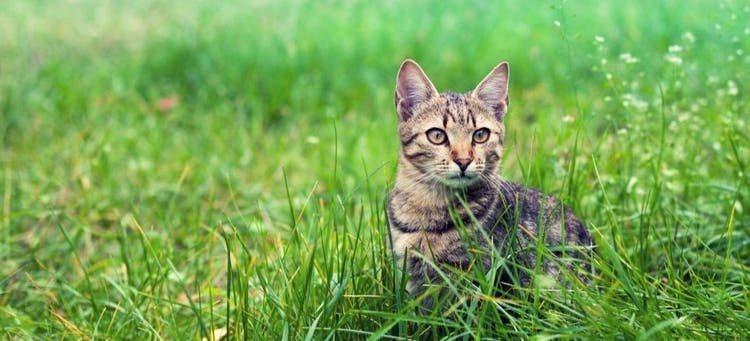
Summer Dangers for Your Outdoor Cat
Summer is in full swing across the U.S., and the heat has come with it.
If you have an outdoor cat, you know they love their independence and, other than some basic tick and flea prevention, you might think they’re OK on their own during the summer.
It is true that cats are pretty resilient, but summer provides dangers for all pets that they might not be prepared to handle. From heat stroke to poisons introduced by landscaping, there are new outdoor hazards all around your pet.
Here are common summer dangers our veterinarians see. Know these exist to help you make a plan to keep your cat from getting sick this summer.
Heat Stroke and Dehydration
You know your cat is highly intelligent, and they are pretty good at keeping cool on their own, but they need resources from you to protect themselves on the hottest days.
While they can likely find their own shade, it’s best if you provide ample cool and covered areas near your home where they can find a breeze. Additionally, leave out plenty of water. Some cat owners will leave out two water dishes — one with water and the other with ice that will melt as the day goes on to provide cool water later in the day.
If possible, consider bringing your outdoor cat indoors during the hottest parts of the day (10 am – 4 pm). Keep an eye on the weather forecast to see spikes in heat. If you see your cat panting, make sure to bring them inside and, if it continues, consult your veterinarian.
One note for all pets in the summer: If you need to take them somewhere, do not leave them inside the car. A car’s temperature can reach 104 degrees in less than 15 minutes on a hot summer day. This is a formula for heat stroke.
Cars
This is obvious in all seasons, but in the summer, there is more traffic and people tend to speed a bit more. We’ve covered this in the past, but, in general, outdoor cats have a shorter life expectancy than indoor cats. Car injuries are one of the leading reasons for this. You obviously cannot keep your cat safe all hours of the day but try to give them safe shelter and play areas near the back of your home, away from traffic areas. Again, if you can bring them indoors, try to do so when the traffic near your home or apartment is highest.
Asphalt and Sidewalks
On hot days, it’s not uncommon to see the road steam. It’s likely you would never think to walk barefoot on such a hot surface, but your cat doesn’t really have a choice. Sure, as an outdoor cat, they are a little more accustomed to rougher surfaces than you are, but it can still be too hot for them. Remember that they are much closer to the ground than you are, meaning that they really feel heat radiating off surfaces.
They likely know how to avoid the hottest surfaces, but again, if possible, help your cat by either bringing them indoors or providing an outdoor shelter area that will keep them cool. If there are paths to their food or water that require them to go over hot asphalt or concrete, try to give those areas some cover or shade to help protect them.
Fleas, Bees, and Ticks
Warm summer weather means pests galore – and they are on the lookout for cats and dogs. Be prepared to manage summertime pet pests like fleas, ticks, and even mosquitoes. In most cases, there are safe, effective ways to prevent or eradicate pest infestations that don’t involve dosing your pet with toxic chemicals. Always read the labels on any pest prevention tools you use to make sure they are pet safe.
Additionally, the buzzing of bees can seem quite attractive to your cat, which can get them stung. If there is a lot of swelling, call your veterinarian, who can suggest an office visit or prescribe an over-the-counter medicine. Watch how your cat responds to any swelling. They may scratch the stung area or pull at their fur. Bring your cat to the vet right away if you notice any abnormal behavior or swelling.
Cookouts and Parties
The warmer months are the time for block parties, picnics, and family gatherings. Everyone loves a cookout, especially your pet, who can find all kinds of table scraps and, if they’re social, make lots of new friends. Some cats avoid parties and others love them!
Food that’s left out, fed, or dropped at a cookout can be dangerous for cats. Staples of a BBQ, like onions and garlic, are dangerous for cats.
Even worse, some guests think it’s OK to give scraps to animals at a party. Talk to your guests about what your cat can have. Politely remind them if your pet has a special diet, is allergic to anything, or if there are any foods on the table that could cause a health problem. You want to enjoy the party too, not worrying about a cat that’s vomiting.
Water
Domesticated cats, even outdoor ones, tend to avoid water. That doesn’t mean they can’t swim, but most of them are not accustomed to it. Still, summer pool parties or parties at the lake can attract your outdoor cat and, if they are mesmerized by the water or chasing something near the water, they may end up taking an unexpected dip. Keep an eye on them, as many will be able to swim, but may be shocked to be submerged in water.
If for some reason you have one of those rare cats that likes to swim, always rinse them off afterward. Chlorine in pools and bacteria in lakes can be harmful. Always offer them fresh drinking water when they’re done.